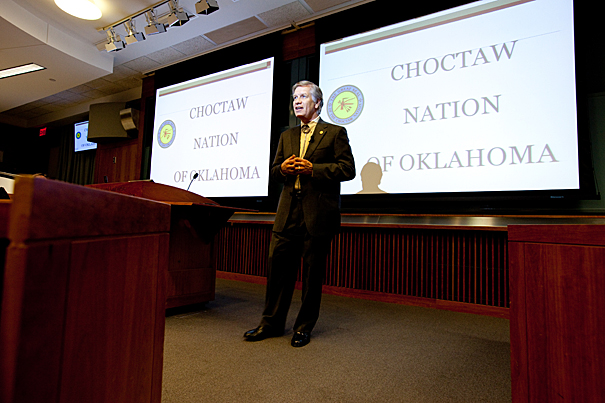
Rose Lincoln/Harvard Staff Photographer
Candid chat with Choctaw chief
Chief Gregory Pyle describes major push to improve tribal life
The chief of the Choctaw Nation took a group of Harvard students into the nitty-gritty daily realities facing a modern American Indian tribe, ranging from making hard business decisions to fighting poverty to playing politics with local governments.
Chief Gregory E. Pyle led what was billed as a “candid conversation” on Tuesday (Feb. 23), as part of a course titled Native American Indians in the 21st Century. The event was co-sponsored by the Office of Student Affairs and the Harvard University Native American Program.
Speaking in a soft Oklahoma drawl, Pyle gave a brief history of the Choctaw Nation, a farming and hunting culture that was forcibly resettled in Oklahoma by the U.S. government beginning in 1832.
He described how his mother as a child was sent to a boarding school, where she was not allowed to speak the Choctaw language. His parents later moved throughout the West seeking work. Pyle’s family resettled in Oklahoma when he was 16.
In 1982, after the U.S. federal government relaxed rules on Indian self-rule, the Choctaws instituted a constitution that created a self-governing, self-sustaining entity, with a legislative and a judicial branch. In 1982, Pyle was hired as a personnel director. He went on to become assistant chief for 14 years, and was elected chief in 1997.
Pyle is credited with making major improvements in the nation’s business operations, which include casinos, manufacturing, and printing units. Since his election, the nation, which has about 200,000 members, has increased its assets from $4 million to $1 billion and its employees from 100 to more than 8,000, according to Gary Batton, the assistant chief.
As Pyle put it, “We found out how to do business in Indian country.” That has included skillfully negotiating with the federal government on its Indian policies, dealing honestly with a case of tribal embezzlement, and finding common cause with sometimes disliked Oklahoma politicians, all developments that Pyle detailed in plain, homespun language. “We actually got consultants in Washington, D.C., and they can tell us how Washington, D.C., runs. They can tell us, ‘You need to be coming up here and talking more.’ ”
He explained that the Choctaws’ approach to social change skirts cumbersome regulations. He described a tribal effort to help a single mother — who had three children and was making minimum wage — receive much-needed job training. The aid effort included buying gas for her car and paying neighbors to look after her kids. In a few months, the woman was able to double her wages. “If you’re nonfederal and nonstate, you can do stuff like that,” he said.
Health issues — such as high levels of diabetes and obesity among Choctaw children — led to building seven health clinics. “When you build on your own, you can build much cheaper and much faster than anybody else,” Pyle said. “We don’t cut corners; we just get it done.”
Pyle said the nation was willing to try any number of programs to see what works. “We’re not afraid to fail because every failure brings us closer to success,” he said. “I’ve coined the phrase, ‘Our executives need gray hair.’ ”
Today, about 2,700 people are learning the Choctaw language on the Internet. About 37 Oklahoma schools and four universities also teach Choctaw, partly because the nation took advantage of high school regulations requiring the teaching of a foreign language. “So we went to the state and said, ‘We’d like to have Choctaw as a foreign language,’ and they OK’d it.”
The Harvard class that hosted Pyle is taught by Dennis Norman, associate professor of psychology and faculty chair of the Harvard University Native American Program and Health Initiative. Norman noted that Pyle’s candid comments allowed students to see “governance in action.”
“Here, you have the leader of the nation sharing his views and values about how they enact government to meet the goals of the people, and I think alternative views of government are really, really important,” Norman said. “There are many examples of incredible growth in Indian country that people don’t know of, and the majority of it has been nongaming.”
Indeed, Pyle and the nation’s tribal councils are working on a strategic plan for the next 100 years.





